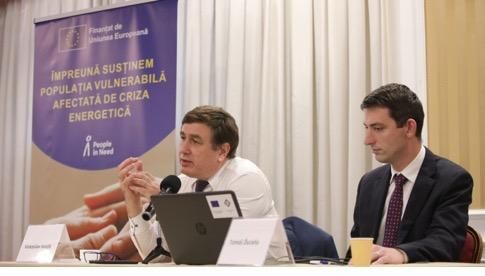Public presentation of the study on the impact of the energy crisis on the most vulnerable households in Moldova

Which are the most vulnerable population groups in need of emergency interventions to overcome the energy crisis and how has the current increase in energy prices affected their living standards? What impact has the energy crisis had on personal debt growth and what are the measures to mitigate the negative effects of the energy crisis? Answers to these and other questions can be found in a study on the indebtedness of the most vulnerable households in Moldova in the context of the energy crisis, carried out by People in Need Moldova in partnership with the Institute for Development and Social Initiatives (IDIS) “Viitorul”, with the support of the European Union.
The research includes information on the impact of the energy crisis estimated on the basis of open data, the opportunity and risks of loans to individuals to overcome the energy shock in 2022, the measures of the Government of the Republic of Moldova to mitigate the negative effects of the energy crisis, as well as a synthesis of qualitative measurements – structural interviews with people from vulnerable groups on the impact of the energy crisis.
The results and recommendations of the study, prepared by economic expert Veaceslav Ioniță, were presented at a round table held at the end of November, attended by representatives of central public authorities, non-governmental and international organisations working in the Republic of Moldova.
Tomáš Ďuraňa, Head of Programmes at People in Need Moldova, said at the presentation of the study: “The issue of energy indebtedness is becoming more and more acute in the Republic of Moldova and requires huge financial costs not only from the Government but also from all actors involved in this support to the most vulnerable people in Moldova. It is very important for us to analyse and understand the data and trends in indebtedness related to high energy costs and see how the situation can be improved in the long term.”
During the event, Veaceslav Ioniță noted that the measures to support the population, announced by the Moldovan Government and adopted by law by the Parliament, provide feasible solutions for most of the vulnerable population in rural areas, who heat in the cold season with wood and coal, provide partially satisfactory solutions for vulnerable population groups in urban areas with central heating, but have an insignificant impact on urban and rural households connected exclusively to natural gas, without the possibility of accessing energy alternatives.
“Ninety percent of the rural population is dependent on wood and coal, with only 10% of them having access to natural gas heating. Considering that the rural population in the Republic of Moldova is, according to data from 2022, about 1.5 million (the population with ordinary residence, at the beginning of the year), or 58% of the total population, this means that the vast majority of the rural population is in a situation of extreme energy poverty,” said the expert, referring to the study data.
According to him, the energy crisis will force people to borrow to overcome the difficulties of the cold season. This objective trend is taking place against the backdrop of restrictive monetary policies of the National Bank, which have already led to higher credit prices and tighter lending conditions from banks. Citizens are forced to migrate from banks to non-bank institutions and moneylenders, which are more expensive, tougher and more complicated to administer. According to the survey, at least 35,000 families have already found themselves in a financial trap, with no prospect of being able to repay the money they borrowed, and about 3% of citizens said they had debts from at least 3 sources.
Veaceslav Ioniță notes in the study’s recommendations that the government’s policy to support the population in the context of the energy crisis must be based on two dimensions: support for socially vulnerable groups, depending on their income, and differentiated support for certain categories of the population, depending on the source of energy consumed. These policies must be implemented by capping the price of energy resources up to a certain level of consumption, with compensation for differences to the supplier of wood – 5-pound metres for the heating season, and to the supplier of natural gas – 150 m3 per household per month, while providing additional financial support to certain vulnerable groups.
The author of the study concluded that under the policies proposed by the Executive, wood at the capped price is not issued per household but per person, so that the most affected segments of the vulnerable population – the solitary elderly people – will benefit from less wood than other vulnerable categories with higher incomes, such as couple families. In the expert’s view, the price cap policy should be targeted at the household and the financial compensation at the individual. The cumulative impact of these instruments, the author believes, will create a differentiated effect on the population: all consumers will benefit from price caps, and the most vulnerable will also benefit from financial support to cope even with already capped tariffs.
The study on the indebtedness of the most vulnerable households in Moldova in the context of the energy crisis was carried out in the framework of the project “Supporting together the vulnerable population affected by the energy crisis”, implemented by People in Need Moldova and funded by the European Union through the Service for Foreign Policy Instruments (FPI).